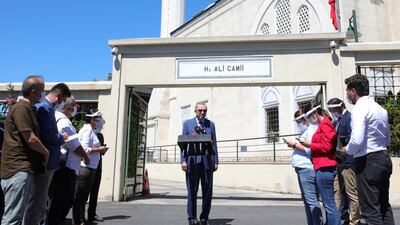Europe has been sent a terror warning after it emerged that senior leaders of the Hamas group were being granted Turkish passports.
At least seven members of a group of 12 senior leadership figures who were expelled from their homeland and were using Turkey as a base had now obtained citizenship, according to a report in the Daily Telegraph.
An official speaking to the British newspaper on the development said the move potentially granted the group more access to European countries where Hamas was suspected of plotting against Israeli citizens.
"These are not foot soldiers but the most senior Hamas operatives outside of Gaza. [They] are actively raising funds and directing operatives to carry out attacks in the present day,” the unnamed source told the newspaper.
"The Turkish government gave in to pressure by Hamas to grant citizenship to its operatives, thereby allowing them to travel more freely, endangering other countries that have listed Hamas as a terror group.”
The report's authors added that they had seen the Turkish identity papers of one of the members, complete with the unique 11-digit number.
Turkey provided a safe haven for the men under a 2015 deal brokered by the US in which it undertook to prevent the group from overseeing operations from its territory. Turkey has since faced repeated allegations that it was allowing or enabling the men to direct operations in their home base.
The passport development replicates the approach of Qatar, where Ismail Haniyeh, the leader of Hamas, is reportedly based. He travels regularly to Turkey, where he meets President Recep Tayyip Erdogan.
Hamas and the Turkish ruling party share an affiliation with the Muslim Brotherhood movement, which is banned in the UAE and elsewhere as a terrorist group.
Among those named as beneficiaries of the Turkish policy was Zacharia Najib, a senior Hamas operative who wasn't accused of plotting to assassinate the mayor of Jerusalem, plus Jihad Ya’amor and Hisham Hijaz.
It was not possible to contact the 12 on the list identified by the newspaper but the report said that Turkish and Hamas officials rejected the allegations.
Turkey is lobbying European nations for visa-free access and its passport grants holders freedom to travel to Japan and South Korea among other destinations.
President Erdogan's relations with Europe have soured as he challenges maritime boundaries in the Mediterranean Sea. The Turkish leader has attempted to exploit divisions in Libya to carve an economic zone across the sea.
Turkey has also antagonised Nato nations by acquiring the S440 Russian-made air defence system in defiance of alliance protocols.
Turkey's decision to send a seismic research vessel accompanied by a small navy fleet into the increasingly volatile region on Monday prompted Greece to dispatch its own military assets to observe what was going on.
France on Thursday announced it was "temporarily reinforcing" its military presence in the eastern Mediterranean in support of Greece.
That decision only further worsened France's tensions with Turkey – already high because of opposing approaches to the Libyan conflict and other parts of the Middle East – and saw the diplomatic rhetoric rise another notch.
"France especially should avoid steps that will increase tensions," Turkish Foreign Minister Mevlut Cavusoglu said on a visit to Switzerland.
"They will not get anywhere by acting like bullies, whether in Libya, the north-east of Syria, in Iraq or the Mediterranean."
Mr Erdogan has warned of a "heavy price" to pay for those who threaten Turkey's Oruc Reis research ship.
"We can't let even the smallest attack go without an answer," Mr Erdogan said on Friday.
Germany, which currently sits as president of the 27-nation European Union, said it was working hard to ease the dispute.
"These tensions are worrying," German spokesman Steffen Seibert said in Berlin.
"What's important is de-escalation [and for countries] to talk directly to each other."


